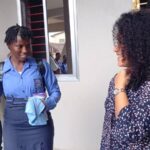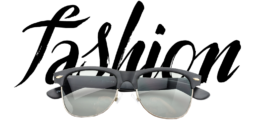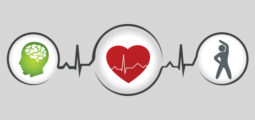MEET ARIANA
An “okada” (local name for commercial motor cycle) nearly hits a pedestrian again, and for the third time today, followed by a stream of invectives. The Friday afternoon traffic at the Kissy road was jammed as usual: vehicles, pedestrians and hawkers all squabbling for whatever little space they could find on the narrow Kissy road tarmac.
I sat in a bus predominantly occupied by the morning shift students coming from school and heading home. The sun was at it’s burning best and the scorching heat was evident in the sweaty faces of the passengers on board. It was truly a hot day, in more sense than just the sun’s heat, as I was also paying keen attention to a heated debate going on amongst the pupils. The argument started as a result of a simple choice of food. A young girl attending the St. Joseph’s Secondary School called an Apple hawker and bought an apple, another girl attending the Freetown Secondary School for Girls called another hawker and bought a cake. Different students from the Albert Academy School, the United Methodist Church Secondary School For Girls (U.M.C), The Government Senior Secondary School, Government Model Secondary School, St. Edwards School, Imatt Academy, Government Rokel School and the Prince Of Wales School all bought various food items, and I settled for a pineapple Sierra Juice to quench the thirst that came with the sweating and dehydration.
The girl who bought the apple playfully teased the girl that bought the cake about her weight and food choice, and whether it was because the girl being teased felt embarrassed or was not just in the mood. She responded by telling the ‘apple girl‘ that she did not know what she was saying. Quite an educative battle for supremacy on food, health and nutrition ensued.
The ‘cake lover’ told the girl with the apple that, even though she had that extra body mass, she was healthier than the skinnier ‘apple girl’. This brought some laughter from some of the other pupils. Another girl attending the U.M.C. School, who was sampling a meat pie seemed to agree with the body mass logic. If someone has more body mass, it indicates they eat and live better and thus healthier she said. The ‘apple girl’ looking either embarrassed or just lost for words seemed to have lost the debate when a seemingly witty young Prince Walean holding a mega cola drink jumped in and remarked, “so is Cristiano Ronaldo and Zainab Sheriff not well fed, are they unhealthy”? The question caused a little discomfort for the giggling ‘rich cake and meat pie girls‘, while the ‘apple girl’s’ eye lit up!
She had been saved and by all indications seemed to have found her speech again. Seeing that the debate had gotten interesting, other pupils decided to have a say. A boy attending the Albert Academy remarked in a hushed voice “people with greater body mass tend to have diabetes”. True, said another boy attending St. Edwards; “obesity is a majority cause of diabetes”. But I was made to understand that young children cannot get diabetes remarked a quiet looking girl wearing the Imatt College uniform. That’s not exactly true said a boy attending the Government Rokel School. “Type 2 Diabetes is predominantly common amongst older people” he said, but it has been seen to occur in children, especially very over weight children, and children are born with Type 1 Diabetes, since Diabetes itself can be transferred from a parent to a child.
The ‘cake kid‘ clearly furious at this point, being that the entire topic had been going against her, tried to shoot a last shot, at least. She asked, “is it only people with bigger body mass that are susceptible to diabetes”? A girl from the Government Model Secondary School observed the quick silence that seemed to have resulted from the abrupt interruption of the ‘ cake girl’ and seized the opportunity. She said no! and in probably the most confident manner of all the previous contributors. She went on to give a detailed explanation on how it was true that obesity can cause Diabetes, but that diabetes can be seen in skinner people. She explained that diabetes can be hereditary and that no matter how thin you are, you can get Type 2 diabetes, because diabetes comes from insulin resistance that causes high blood Sugar. Another pupil from the Government Secondary School also added that even with Type 1 Diabetes, weight is not a risk factor. If you have a family history of diabetes or it’s in your genetics, you may develop diabetes. The Government Model Secondary School pupil agreed and maybe to point out how versed she is in the topic, she also mentioned how there’s also a Type 3 diabetes that results mainly from gestational diabetes i.e diabetes developed during pregnancy.
Seeing that all parties seemed to have had their say and accepted that there was no clear-cut winner or loser, or maybe the opposing parties were content with calling a truce and enjoy the ride home. I decided out of both curiosity and the need to be part of the discussion to have a say, I asked completely out of the blue; what can we do to prevent diabetes then!?
Maybe because I dressed like I was someone important on that day or they had noticed that I had been listening in on their conversation, a bulk of these young students started throwing answers at me. I was thrown aback for a second but having walked in those same shoes a couple of years back, I knew I had to earn their trust by communicating with them as equals. So I summoned the courage to get them to tell me one at a time, those who are willing to contribute.
-
The first pupil pupil advised that we should try as best as possible to cut sugar and refined carbs in our diets because they increase blood sugar and insulin levels which may lead to diabetes over time.
-
Regular work out was mentioned by another student, as exercise increases the insulin sensitivity of our cells. When we exercise, less insulin is required to keep our body sugar levels under control
-
A third pupil advised that we should try and drink water as our primary beverage. Drinking water helps control sugar and insulin levels, thereby reducing the risk of diabetes.
-
A fourth student advised that we try to lose some weight if we’re overweight or obese, because carrying excess weight, especially in the abdominal areas increases the likelihood of developing diabetes
-
Another pupil pointed out the need to be more active and avoid sedentary behaviours. Plenty people tend to drive to their offices, sitting down in their vehicles and transition into the office chair, then back to a restaurant chair, then to their cars and eventually to their sofas and beds, and they do this every day. Avoiding sitting down this much reduces the risk of getting diabetes.
-
The next pupil pointed out the need to eat a high-fibre diet, because consuming a good finer source at each meal can prevent spikes in blood sugar and insulin levels, which may help reduce our risk of developing diabetes. These are some of the many preventive measures mentioned that i can remember.
Out of the same curiosity I asked these students how they came to be so knowledgeable and versed on a very critical health issue affecting our nation and the world at large. As was already established in our trend of communication, the Prince Walean told me that in fact the, the 14th November is World Diabetes Day and that CITIGLOBE LTD. A renowned Pharmacy based in Freetown and NARNIA EDUCATIONAL GROUP had led a four days diabetes prevention tour among students at 10 junior secondary schools in Freetown, from the 9th to 12th November, 2021 that had orientated them well on everything they needed to know about diabetes prevention.
This encounter was one that enlightened me. I was made to understand that at the end of the day , we have control of many of the factors that influence diabetes. Eating the right foods and adopting healthier lifestyle behaviours will give us the best chance at avoiding diabetes.
Exercise plays a major role in the fight against diabetes. The american diabetes association recommends 150 mins of exercise per week to prevent and manage diabetes. Exercise helps to reduce insulin resistance hence control your blood sugar levels.
Let us join hands in making World Diabetes Day a reality, let us prevent and manage diabetes, its a pain in the pancreas. We hope you continue the journey to be physically active to prevent obesity and diabetes.












